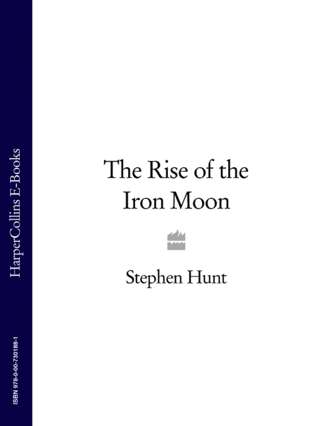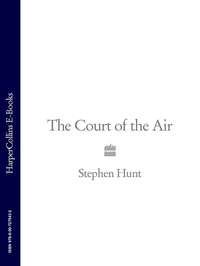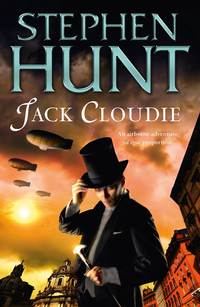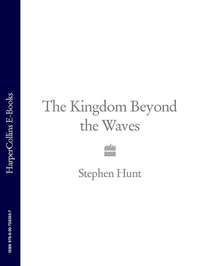
Полная версия
The Rise of the Iron Moon
‘He’s young metal.’
‘His body might be young, dear mammal, but his mind is the latest incarnation of a long line of ancient wisdom. King Steam does not make mistakes, and neither do I.’
The sinking feeling in Molly’s gut was getting worse. ‘It’s coming back towards us, isn’t it?’
Lifting the equation-filled paper from the hands of a mu-body, Coppertracks scanned the maths, and then nodded. ‘Yes, you are quite on the mark. Ashby’s Comet is returning. Given its present size and position, there is only one explanation that fits the mechanics of the situation. Ashby’s Comet must have used the gravity well of Kaliban to slingshot around the celestial body of the red planet, and, as you say, come back towards us.’
Molly tried to keep the panic out of her voice. ‘Returning towards us to ram into the Earth?’
‘No,’ said Coppertracks, ‘my calculations suggest the comet will not collide with us, but pass near enough by that it will be captured by the gravity of our world. I believe, dear mammal, that we are soon to have an extra moon sitting in our sky.’
‘Please, now,’ wheezed the commodore, his breath misting in the cold air of the chamber. ‘This is a huge great comet in the heavens we are speaking of, not a billiard ball knocked around across our table of velvet downstairs.’
‘I do believe you are closer to the truth than you realize,’ said Coppertracks. ‘Ashby’s Comet must have impacted with another minor celestial body after it passed us by, its trajectory nudged into the gravitational pull of Kaliban and set on a new course back towards us. A billiard table is exactly what our celestial bodies’ dance of orbits and velocities have become.’
‘Is that it, then?’ said the commodore. ‘A cruel chance meeting of vast stones in the heavens and now we are to have a new moon.’
‘How long?’ asked Molly. ‘How long before Ashby’s Comet returns to our skies?’
‘My estimation at this point would be in the order of five days.’
Five days! The Broken Circle cultists would have a field day when the comet they believed augured the end of all times returned and set up permanent residence in the heavens.
CHAPTER THREE
The force commander looked out across the plains of Catosia: green fields irrigated by aqueducts that ran out from the city behind her like spokes on a wheel. All except the sparring fields, of course, which were dust, rock, trenches and cover. No olive groves or rows of corn there. That was where the civilized cities of the Catosian League settled their differences using free companies such as hers. Professional fighters and citizen soldiers with a taste for it who would flourish their drug-swollen muscles – so large in some cases that their war jackets could barely contain their flesh – before commencing the ritual of battle. Fighting in front of the judges from the nearest city both sides could agree as neutral in whatever dispute had sparked the fight. That was the way the civilized people of Catosia made war. Unlike, of course, the other nations of the continent. The fat, complacent Jackelians, who relied on their cowardly monopoly of airships and fin bombs to preserve their freedoms, or Kikkosico to the southeast, with the god-emperor’s shiny legions trampling across the pampas.
Which made it all the more painful to the force commander that her sparring fields lay empty. No judges in purple togas. No audience behind the observer wall, cheering their citystate’s women into battle from the relative safety of angled viewing slits. Instead, the city-state of Sathens’ towering walls were reconfiguring for a full siege; the pneumatic pumps hissing as her battlements raised themselves to full combat height. Seven-inch thick steel plating gliding up and into position, clanking as the walls moved forward to create buffer cavities that began to fill with sand-like compounds piped up from the underground silos ringing the city. The streets of the city were being reshaped in the opposite direction, tall towers sliding down into underground holds, doors and windows disappearing behind blast plates as the lower rise buildings rotated to present a blank face to their thoroughfares.
Inside the Catosian city, a state of change had infected the population too. After the people of Sathens had taken in the survivors from the city of Unarta, the normally turbulent currents of their city’s anarchy had converged into a single focused stream of purpose. Survival. Survival against the terrible horde their neighbour’s survivors had nicknamed the Army of Shadows. Every voter of Sathens had filed past the crystal head of the goddess their city state had been named for, filed past long into the night, dropping in their pebbles. White for war. Black for peace. When the sun rose over the central square, the crystal goddess had stood proudly as a mass of shimmering white in the sunrise. Not a mere sparring war against civilized neighbours, where the citizens would go unhurt and the city’s infrastructure would be spared. Total war. Absolute war. The sort of war barbarian nations such as the Kingdom of Jackals and Quatérshift still foolishly practised against each other. The sort of war that nobody had been unwise enough to wage against any city-state of the Catosian League in a long, long time. Leave your sword at home or your corpse in Catosia was the adage that was often directed towards foreigners.
Jackelians might look down on the Catosian League because they treated war with the codification of a duel, but that was only between the city-states. For foreign barbarians, the Catosians practised a different sort of war altogether. Even the men would fight, those who weren’t guarding the children in the city vaults. Ever since the population had voted, the drinking water of Sathens had run crimson with the holiest and rarest of their drugs, the Blood of Forman Thawnight. Some of their men had refused to drink it – the philosopher scientists, so ethereal and haughty in their starched white robes. Their contribution to the war effort would be in tending to the automatics, they had argued, in converting the cogs and artful clockwork mechanisms of their mechanical servants to a war footing. But their wives had known better. They had dragged their menfolk to the drinking basins and plunged their faces under the water until they could breathe no longer and were forced to sup the drug-filled waters. And where the men had no wives, the warrior maidens of the free company had broken down doors and performed the same rites on the trembling virgin lads.
Now the Catosian law that all men must walk clean-shaven save in time of war was showing its worth. Within days of drinking the Blood of Forman Thawnight, the men of the city had sprouted beards that would have made a polar barbarian proud. Sathens’ nights had been filled with the sound of its men screeching their newfound rage at the stars. The mornings found adrenaline-twitching husbands begging their wives to pass on the skills of the women’s mandatory daily war practice.
The force commander extended her brass telescope to its maximum length and was about to raise it to her eyes when one of the philosopher scientists barged forward and offered her a heavy double-tubed binocular set. ‘Use these. Gas compression lens. Triple the range of that old piece of brass.’
‘You have been busy,’ said the force commander, approvingly.
‘A toy!’ shouted one of the scientist’s fellows. Then he proudly pointed to his ranks of automatics shining like steammen knights in front of the city’s walls, jangling with maces, spears, and ammunition bins. ‘Does he expect you to toss his binoculars towards the enemy’s helmets and brain them? I took four of my own servants and built them into a cannon, a cannon that walks! What is that piece of optics compared to my genius?’
The two males looked as if they were about to start wrestling over the matter, but a company leader stepped forward and as she drew her sword, both men hurriedly stepped back into the ranks.
‘The enemy had better come soon,’ whispered the force commander’s aide. ‘Trying to keep any semblance of discipline among these damned males …’ ‘Be careful what you wish for.’
‘The city of Unarta was not expecting an attack,’ said the aide. ‘There is no element of surprise here. Our city is reordered for war, as are our people. Even my little husband will fight today.’
‘What else can we expect from filthy barbarians?’ said the force commander. ‘A declaration spear shoved into the sparring field and five days of feasting with the opposition free company first? Well, we shall have the measure of these foreign dogs soon enough.’
There was a rifle shot below as one of the free company officers punished a fighter trying to break the order of the line. Another male overcome with the berserker fury of his drugs a little too early.
‘Save it for the enemy,’ muttered the force commander.
Yes, the enemy. Unarta’s survivors had been hysterical. Men, of course. No warrior woman would willingly abandon her city. Carry me to victory or carry me home on my shield. The end had come shockingly fast, but there was one thing Unarta’s survivors agreed on. The cloud. The hideous crimson cloud gathering overhead and a darkness like night falling during the high heat of the day. Something terrible was coming out of the north. But what was the Army of Shadows? The far north was just a wide wilderness, worthless ice plains and glaciers left over from the age of the coldtime. It had been centuries since any lord of the north had emerged capable of uniting the polar barbarians’ feuding tribes.
A flaming cloud was rolling forward, shadows lengthening across their olive groves. The force commander rolled a wheel on the side of her binoculars, a hiss escaping from the instrument as its amplification was pushed beyond its safety parameters. At last, she saw the enemy; saw what the hundreds of thousands of corpses now rotting at Unarta had seen before they died.
The Army of Shadows was like nothing any Catosian city-state had ever faced before. The force commander experienced a feeling she had never known before. Fear.
She slammed her rifle against her shield and the drumming was taken up across the thousands formed up in front of the wall and the thousands more manning the ramparts. Anything to smother the feeling of dread rising in her stomach. Did her fighters realize they were now drumming their own march into the gates of hell?
CHAPTER FOUR
Molly saw Commodore Black opening the door to Tock House just as she was struggling up the main staircase with a wooden crate full of periodicals, news sheets and journals. The old u-boatman rushed over to pick the box out of his friend’s arms. With his bulk and strength he lifted it up easily before she caught him remembering to put on a show, pretending to puff and struggle.
‘Have you been laying in reading material for Coppertracks, lass? The old steamer is off in the woods again, tinkering with his tower – his genius is occupied enough for now, I think. No need for these.’
‘These news sheets aren’t for his distraction, Jared,’ replied Molly. ‘I need to track down Oliver Brooks. Coppertracks can find patterns in the information, things too subtle for me to notice. Somewhere in here is the clue to where I can find Oliver.’
‘Good luck to you, then, for our old steamer isn’t noticing much these days except his tower and his dreams of conversing with the man in the moon.’
Molly looked towards the house’s orchard. The tip of the lashed-together tower was just visible over the trees. ‘He wants to prove the Royal Society wrong.’
‘He wants revenge,’ said Commodore Black. ‘That’s what his boiler heart desires now, and that’s not an emotion that sits well with a blessed steamman.’
And that was equally true of another creature of the metal Molly was well acquainted with. She thought of the Hexmachina’s final plea to her before it was frozen in the centre of the earth. It seemed so much like a dream now, she was half-doubting her own memory of the vision. Perhaps she had been working too hard of late?
Molly left the commodore and walked over towards the orchard. She had always loved the peace of the apple and pear trees, left to run slightly wild in their grounds. In the summer months, Molly would take an old collapsible card table from the cellar of the house and set it up in a glade alongside the ruins of an overgrown gazebo. There she would lay her writing paper and pencil down on the green felt top, watching the butterflies flit over the lilacs while she imagined tales of terror to stir the hearts – and pocketbooks – of the penny dreadful readers. Now, of course, she had the presence of Coppertracks’ tower of science for company, a small Porterbrook-model portable steam engine chugging away beside the ever-lengthening pyramid of lashed together girders, crystals and cables.
Molly could tell that Coppertracks was agitated, his mu-bodies falling over themselves to keep the tower running smoothly as his attention darted between his drones and the task at hand. One of the drones held a cluster of cylinders to its cyclopean eye, taking a reading from the sun, while Coppertracks seemed more interested in a large sheet of calculations resting on her card table, still out from her morning writing session. As Molly got closer, she saw there was also a map of the stars open before him – she even recognized a few of the constellations.
‘What’s the matter, old steamer?’ Molly called.
‘The matter? Why, everything is the matter, Molly softbody. Reality is not as it should be.’ Coppertracks’ caterpillar tracks ground at the grass in frustration. ‘I have been checking the declination of my tower’s transmissions to our closest neighbour in the heavens, Kaliban, and I have been missing the red planet by at least two degrees.’
Molly stared up at the dish at the top of the tower, a polished silver shield like a giant’s porridge bowl turned on its side. ‘Maybe the rain last night knocked your dish out of kilter? It sounded like it was becoming quite a squall from my bedroom.’
‘That is what I had assumed too, but my mu-bodies have checked and rechecked the tower and my apparatus has not shifted by an inch. It is transmitting at exactly the same angle as it has always been, yet now my signals are passing by Kaliban and falling away into the void.’
‘Then if your tower hasn’t moved, the logical conclusion to draw would be that it is either the Earth or Kaliban that has shifted.’
‘Precisely, but as we both know, that is impossible. Celestial bodies do not jiggle around their orbits like fidgeting young children swapping desks in a classroom.’
‘Very odd,’ said Molly. A puzzle fit for one of her celestial fiction novels, certainly.
‘It gets worse,’ said Coppertracks. He indicated the constellation of the Windmill on his astronomy charts. ‘I have been checking the position of the stars from my observations the other night against the official charts and something is terribly wrong. While some of our stars are precisely where they should be, others have changed station, a couple of stars have vanished entirely, and I have even found a new star appeared as if from nowhere.’
‘Surely not? You always told me—’
‘Yes, I know,’ said Coppertracks ‘and I still hold to my people’s belief that the stars are celestial bodies similar to our own sun, but viewed from the vantage point of an incredible distance. Huge cosmic kilns many times larger than our own world, able to circulate heat with an efficiency that makes my own boiler heart look like a toy.’ Coppertracks tapped his charts. ‘But measuring against the astronomical record, the face of night above us has been transformed in a manner that should be impossible. Conventional science can offer no explanation for this. We might as well subscribe to the teachings of the old Quatérshiftian religion and assume that Furnace-breath Nick is flying through the sky on his demon steed, snuffing out the candles of the Child of Light and firing up his own wax lights in their stead.’
Now Molly saw why Coppertracks was close to despair. Entire stars disappearing, while their neighbours twisted across the firmament to settle in new positions. It made even the problem of a new moon appearing in the sky appear like a mere distraction in the cosmic ordering of things. What if their sun should just disappear? It would be as if the boiler were turned off at Tock House in the dead of winter. No heat, no light. An eternal winter of such ferocity would make the coldtime look like a picnic in Goldhair Park on a balmy summer afternoon. The world would die, as would every creature that swam, walked, flew or crawled across its surface.
‘So what are you going to do about it?’ asked Molly. ‘Does King Steam know about this?’
‘I am certain he does,’ said Coppertracks, distractedly. ‘With our new array tracking Ashby’s Comet, King Steam’s astronomers would have to possess defective vision plates not to have noticed this.’
Coppertracks’ mu-bodies began shinning up the tower, recalibrating the transmission dish and showering Molly with flecks of paint and dust from the girders as they scrambled about on high.
‘You’re continuing with your work on the tower?’ Molly was flabbergasted.
‘Dear mammal, the forward momentum of science must not be swayed off-course by an as-yet-undiagnosed disorder in celestial mechanics. I must press on with my transmissions.’
Above their heads, the dish was ratcheted around to a new setting.
‘Even if you find someone on one of the other celestial spheres with a level of engineering as advanced as ours and willing to converse with you, what in the name of the Circle would you say to them now?’
Coppertracks stopped for a second, as if this thought – of all the thousands he was capable of processing in parallel in his impressive mind – had only just occurred to him. ‘Say? In this instance, I believe I would say hello.’
Pulling the lid off two drum-like chemical batteries, Coppertracks’ drones observed the mixture bubbling inside and pronounced themselves satisfied. It was always dangerous, using wild energy, the power electric, but nothing else would do for throwing a pulse across the heavens. Luckily for the inhabitants of Tock House, scanning the heavens for a reply didn’t require a discharge, or their orchard would soon resemble Lady Amazement’s Lightning Gardens down at Makeworth Park. As distant as Molly’s neighbours were behind the ground’s high walls, Tock House had already seen a number of petitions circulating in the village as a result of Coppertracks’ unorthodox scientific interests.
A spectral moaning along the iron girders warned Molly that the pulse of exotic waves Coppertracks intended to direct towards Kaliban was about to be released. She moved back beyond her card table as emerald energy lit the girders, sparks raining down over the ruined gazebo. With a bacon-like sizzle the dish vibrated at the top of the tower, a couple of holding pins blowing out, followed by a dying whine as the apparatus powered down. Coppertracks’ mu-bodies were back over the tower instantly, like ants on a picnic basket, checking it for signs of damage and resetting it to its receiving configuration.
‘Excellent,’ said Coppertracks, checking the signal readings on a bank of dials at the foot of the tower. ‘A clean send with very little leakage this time. Tight and focused. Each time we do this, it gets easier to calibrate the tower for an optimal transmission.’
Molly took a step back – the line of crystals running up the far side of the tower was starting to vibrate, the grass under her feet trembling with the force of it. Dials twitched violently across the board on Coppertracks’ instrument bank. ‘I think that might have been a pulse too far, old steamer. Should we start running and take cover now?’
Coppertracks’ stacks whistled in excitement as he momentarily lost control of his boiler function. ‘By the beard of Zaka of the Cylinders, that is no feedback loop! It’s a signal. Molly softbody, someone is answering my communication!’
His mu-bodies rushed to the tower from wherever they were standing in the glade in a fury of coordinated action, the steamman desperate that this message should not be lost. For all his practice in sending transmissions over the past year, he was a virgin at the art of receiving anything other than the occasional internal test.
‘This is odd,’ said Coppertracks, checking his equipment bank.
To Molly the whole thing felt odd. She was actually present at the receipt of the first communication from another celestial body within their solar system. Who would believe that she hadn’t just invented the whole tale for publicity? ‘What is it?’
‘This can’t be a reply to my communication, it’s the same message repeating on a loop, over and over.’
‘A loop?’ said Molly. ‘Who would want to put a message on a loop?’
‘The logical inference would be someone who needs assistance, possibly someone who has long been deactivate and unable to switch their transmission off.’
‘How long do you think it will take you to translate it?’
‘No time at all,’ said Coppertracks. ‘The message is in binary mathematics and transmitted using something similar to crystalgrid code, dashes and dots that any station operator in the capital could understand. It carries a table key at the front based on the periodic table with the translation of their language.’
Molly hardly dared to ask the next question. ‘And it says …?’
‘They are coming,’ said Coppertracks. ‘That is all it says. Over and over again. They are coming.’
The steamman and Molly stared up at the Kingdom of Jackals’ grey cloudy sky, Molly imagining that she could see Kaliban as it appeared in the images from King Steam’s observatory. Plains of red sand and barren mountains. Vast dead valleys. A world that now conclusively harboured enough life to send them a message. Possibly their last.
A tear welled in Molly’s eye. ‘Hello.’
Molly saw Commodore Black fiddling with the rusty lock to the roof of Tock House, but Coppertracks was nowhere to be seen in his laboratory.
‘Where’s the old steamer gone now?’
‘Have you checked the orchard, lass?’ asked the commodore.
Molly looked at her crates of periodicals, news sheets and journals, hardly touched, despite her protestations to Coppertracks about the Hexmachina’s warning. Did the steamman still believe her vision of the ancient god-machine was a result of stress and fever? ‘That was the first place I checked, but he wasn’t there.’
‘Then perhaps he has finally had a bellyful of that message of his, repeating over and over again like a parrot trapped in a cage.’
It was a mystery, right enough, yet as much as the steamman analysed the message for hidden patterns or deeper clues, there appeared to be no other information forthcoming from the signal. Molly sighed. ‘I dare say he’s gone to the crystalgrid station to transmit word to King Steam of his lack of progress.’
‘There’ll be no progress in this mortal matter,’ said the commodore. ‘His tower of science has found nothing but a message in a bottle, cast off by some poor wretch. The Circle knows how long that signal has been rattling around up there. I found as many when I was master and commander of my beautiful u-boat. Bottles lying on the seabed, their paper washed of blessed meaning by the waters and the ages and the changes in language. Half of them from bored sailors tossing away sheets of their diaries in empty rum bottles for a jape.’
‘Coppertracks is certain the message originates from Kaliban.’
The commodore shrugged. ‘Well, we’re never going to know.’
Molly rattled one of the crates, frustrated at the lack of progress. ‘Then what good are these newspapers to me? I can’t use them to help me find Oliver Brooks. Meanwhile stars are disappearing, a comet is heading back towards us to take up residence as a new moon, and I’m not even sure if the warning I got from the Hexmachina wasn’t just the result of a slip on the curb and a bump on my head.’








